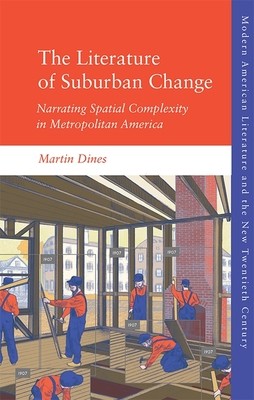
- We will send in 10–14 business days.
- Author: Martin Dines
- Publisher: Edinburgh University Press
- ISBN-10: 1474426484
- ISBN-13: 9781474426480
- Format: 14.5 x 21.8 x 2.3 cm, hardcover
- Language: English
Reviews
Description
Explores how American writers articulate the complexity of twentieth-century suburbia
- Examines the ways American writers from the 1960s to the present - including John Updike, Richard Ford, Gloria Naylor, Jeffrey Eugenides, D. J. Waldie, Alison Bechdel, Chris Ware, Jhumpa Lahiri, Junot DÃaz and John Barth - have sought to articulate the complexity of the US suburbs
- Analyses the relationships between literary form and the spatial and temporal dimensions of the environment
- Scrutinises increasingly prominent literary and cultural forms including novel sequences, memoir, drama, graphic novels and short story cycles
- Combines insights drawn from recent historiography of the US suburbs and cultural geography with analyses of over twenty-five texts to provide a fresh outlook on the literary history of American suburbia
The Literature of Suburban Change examines the diverse body of cultural material produced since 1960 responding to the defining habitat of twentieth-century USA: the suburbs. Martin Dines analyses how writers have innovated across a range of forms and genres - including novel sequences, memoirs, plays, comics and short story cycles - in order to make sense of the complexity of suburbia. Drawing on insights from recent historiography and cultural geography, Dines offers a new perspective on the literary history of the US suburbs. He argues that by giving time back to these apparently timeless places, writers help reactivate the suburbs, presenting them not as fixed, finished and familiar but rather as living, multifaceted environments that are still in production and under exploration.
- Author: Martin Dines
- Publisher: Edinburgh University Press
- ISBN-10: 1474426484
- ISBN-13: 9781474426480
- Format: 14.5 x 21.8 x 2.3 cm, hardcover
- Language: English English
Explores how American writers articulate the complexity of twentieth-century suburbia
- Examines the ways American writers from the 1960s to the present - including John Updike, Richard Ford, Gloria Naylor, Jeffrey Eugenides, D. J. Waldie, Alison Bechdel, Chris Ware, Jhumpa Lahiri, Junot DÃaz and John Barth - have sought to articulate the complexity of the US suburbs
- Analyses the relationships between literary form and the spatial and temporal dimensions of the environment
- Scrutinises increasingly prominent literary and cultural forms including novel sequences, memoir, drama, graphic novels and short story cycles
- Combines insights drawn from recent historiography of the US suburbs and cultural geography with analyses of over twenty-five texts to provide a fresh outlook on the literary history of American suburbia
The Literature of Suburban Change examines the diverse body of cultural material produced since 1960 responding to the defining habitat of twentieth-century USA: the suburbs. Martin Dines analyses how writers have innovated across a range of forms and genres - including novel sequences, memoirs, plays, comics and short story cycles - in order to make sense of the complexity of suburbia. Drawing on insights from recent historiography and cultural geography, Dines offers a new perspective on the literary history of the US suburbs. He argues that by giving time back to these apparently timeless places, writers help reactivate the suburbs, presenting them not as fixed, finished and familiar but rather as living, multifaceted environments that are still in production and under exploration.


Reviews